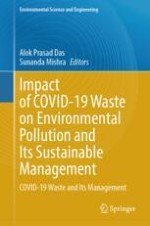2024 | OriginalPaper | Buchkapitel
19. COVID-19 Biomedical Waste Disposal Management Challenges, Solutions and Prospects During and Post COVID-19 Pandemic
verfasst von : Deepak Sawant, Shivaji Kashte
Erschienen in: Impact of COVID-19 Waste on Environmental Pollution and Its Sustainable Management
Verlag: Springer Nature Switzerland
Aktivieren Sie unsere intelligente Suche, um passende Fachinhalte oder Patente zu finden.
Wählen Sie Textabschnitte aus um mit Künstlicher Intelligenz passenden Patente zu finden. powered by
Markieren Sie Textabschnitte, um KI-gestützt weitere passende Inhalte zu finden. powered by
